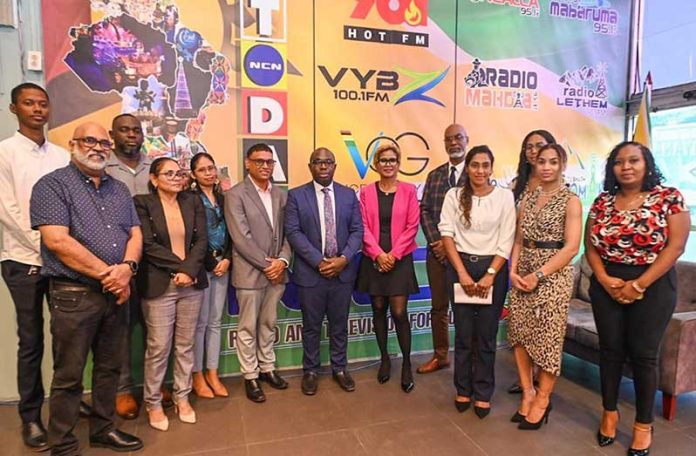Minister McCoy Reflects on the Evolution of Radio with Veteran Broadcasters
As the world celebrated World Radio Day on February 13, veteran broadcasters in Guyana, some with over six decades of experience, took a moment to reflect on the rich history and evolution of radio in the country. During the National Communications Network (NCN)’s celebrations, Minister within the Office of the Prime Minister with responsibility for Public Affairs, Kwame McCoy, emphasized the enduring importance of radio as a medium for disseminating news and information.
“Radio remains a vital source of information across all walks of life,” Minister McCoy stated. He highlighted radio’s role in transforming society and fostering awareness among the populace. “It is crucial to recognize that for radio to thrive, it requires the support and commitment of the government,” he explained, underscoring the need for a democratic environment that champions freedom of expression.
Today, Guyana boasts 22 radio stations, a testament to the medium’s growth since its inception over 70 years ago, beginning at the Philharmonic Hall in Water Street, Georgetown. The first registered station, initially VP3BG, underwent several name changes before becoming ZFY.
Veteran broadcaster Ron Robinson, reflecting on his nearly 60-year journey in radio, recounted his early experiences. “I learned so much from pioneers like Vic Insanlly, Pat Cameron, and Rafi Khan. The standards were incredibly high; our listeners relied on us for accurate and engaging storytelling,” he recalled.
Robby Reis, another broadcasting veteran, noted that while other Caribbean nations had embraced television, Guyana remained reliant on radio for entertainment and information. He reminisced about the rigorous audition process for aspiring broadcasters, which included demonstrating proficiency in both English and Dutch, alongside delivering news items and commercials.
The technological advancements of today contrast sharply with the simpler tools of the past. Broadcasters once operated manually with consoles, tape machines, and turntables, dedicating significant effort to research and audience feedback to create compelling programming.
Rosemary Benjamin-Noble, a respected figure in broadcasting, affirmed the lasting impact of radio. “Even in a car, you listen to the radio. It continues to play a crucial role in our daily lives,” she remarked, highlighting the unique connection that radio fosters between announcers and listeners.
Together, these veteran broadcasters acknowledged the transformative power of technology on the radio landscape, while celebrating the profound legacy and influence of radio in shaping Guyana’s media environment.


